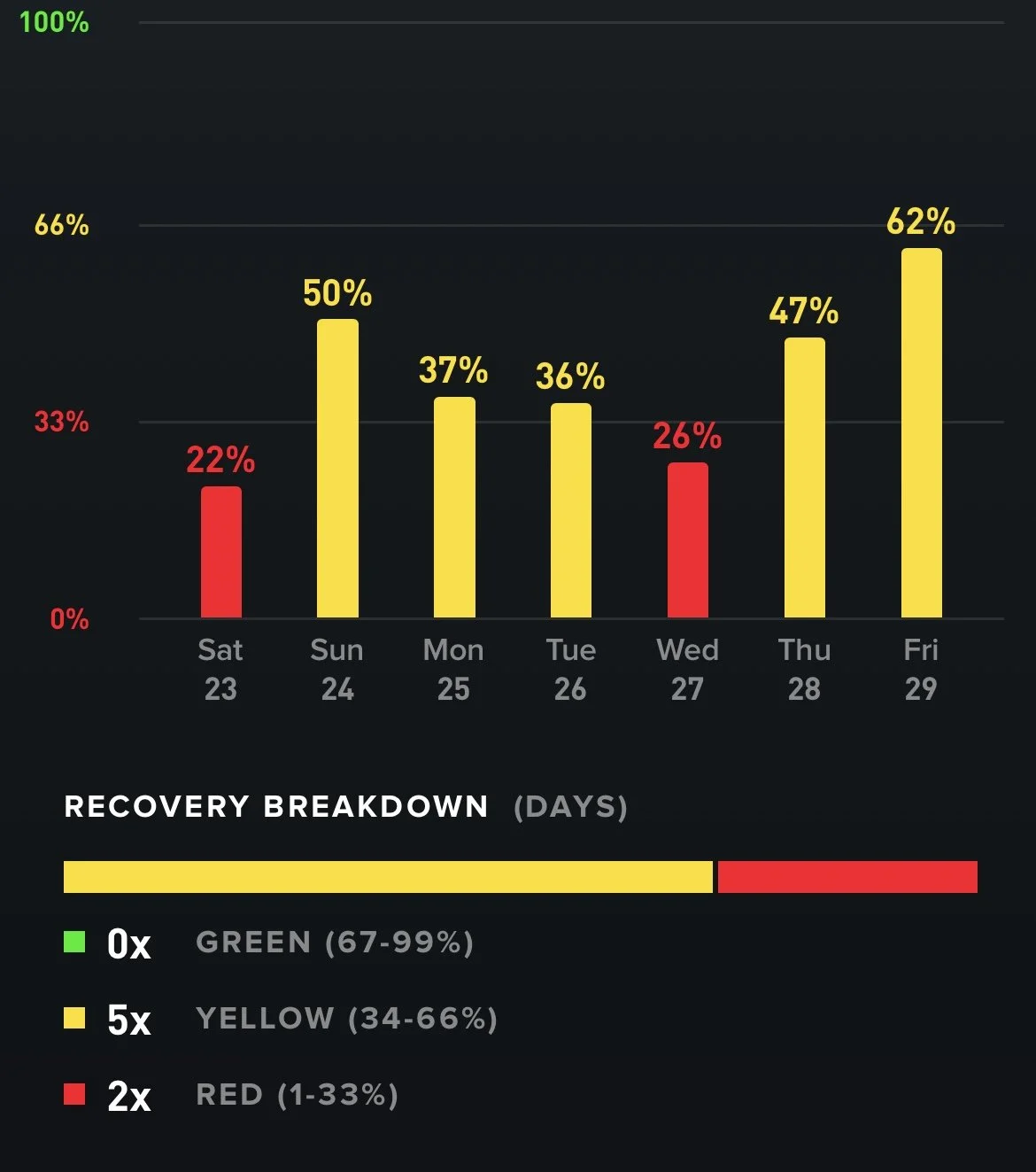How do you deal with stress?
Tuesday, I had an appointment with my medical provider, and I had a lightbulb moment. My doctor says “Yeah, keeping up with the momentum of school is so much better than having to stop and then get slammed right back into it like you did.” You know, he was right. I had a few months off from my routine and I’ve been thrust right back into it full speed! ” It was one of those instances where I didn’t realize something, I just had to have someone else point it out to me.
I have been wearing a WHOOP for years now. It’s a great way to keep a good look at how I handle everything life throws at me. I don’t live and die by it, but it proved to me when COVID-19 became a thing, that our bodies fight well before we feel like junk. So, I am dedicated to knowing what’s going on with me, how I handle stress, how I recover, sleep, how my cycle helps or hurts me, and how my workouts serve me. It is a tool-just a tool- not the end all be all. For the past week, my recovery has been down. More than usual as you’ll see in this photo
I haven’t changed anything. But the stress is piling up in life, and I realized it during my doctor’s visit yesterday. Cumulative stress adds up like a bank that sometimes overflows, but no withdrawals are made. Some people have very little of it. They have a work-life balance, are making enough money, or can use their free time for stress management. How do you handle stress? Clearly, my sleep quality suffers, yet I keep going and never completely switch off because I’m a nurse, a student, an athlete, and a partner. I’m also still grieving the loss of my Mom and my boyfriend’s Mom. Then to add insult to injury, we have three (amazing) dogs that regularly wake us from a sound sleep in the middle of the night. While most of this stress seems self-inflicted, I feel it’s necessary to acknowledge and see how it affects me. The way I handle stress is generally internalized.
There is good stress. Some stress leads to a better you, like exercising, and even exercising your brain to learn. But how do we know it’s too much? I knew yesterday some of my stress was building when I broke down crying for a solid 15 minutes after seeing a memory on my Facebook page that my Mom wished me a happy daughter’s day. My Mom and I were as about as opposite as opposites could be. But holding her hand and watching her die, forever changed my idea of her. It didn’t make me forget the sometimes very selfish and cruel things she did to me, but it made me value her differently, because she brought me into this world. Now, that person who carried me was gone. I’d never see or hear from her again. There was way more to the situation, and quite honestly, I feel that she escaped being a prisoner in her own body and was finally pain-free.
Sometimes, we may burst with emotion, become ill, or feel overwhelmed to the point where we can’t continue living with it. But the only way to deal with it is head-on. Not one of us will live life unscathed by stress. It may be short-lived or continue until we finally do something about it. Do you run away from it or at it? One thing is certain, that those who run away from it may do more harm than good.
An article titled Optimizing stress: An integrated intervention for regulating stress responses coins the term optimizing stress and our response rather than avoiding it. We can use stress to build confidence, improve or even save relationships, and learn. It is like avoiding a tough conversation that you know you need to have with someone for far too long, and then it destroys a friendship with someone because you just decided not to deal with it. Far too often, I hear the phrase, “I didn’t tell them how I feel because they won’t listen anyway, so what’s the point?” A person who says this is taking the easy way out to avoid something. Otherwise, they should be compensated for being able to tell the future Crum et al., 2020.)
How will you optimize your stress? The athlete improves performance through repetition, the student learns by failing, the wife sets boundaries to avoid resentment, and the manager provides feedback to develop an employee.The key is to practice stress optimization to be an advocate for yourself, to know when enough is enough, to genuinely seek to improve those around you, and to be the best version of you. Cowering in the corner from challenging situations will only lead you back to the corner, feeling lost, and under-appreciated. Enter the victim mentality; where everything is everyone else’s fault, and you are the one who is suffering. I ended this week still tired, but I took action to get to bed earlier, eating a treat I really wanted, and backed off on doing 2 workouts a day. Sometimes, enough, is just enough and our bodies are amazing at telling us when enough is enough if we pay attention to it.
Refernences:
Crum, A. J., Jamieson, J. P., & Akinola, M. (2020). Optimizing stress: An integrated intervention for regulating stress responses. Emotion, 20(1), 120–125. https://doi.org/10.1037/emo0000670
